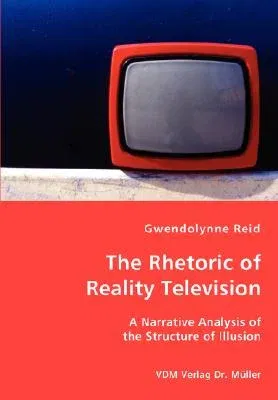Gwendolynne Reid
(Author)The Rhetoric of Reality Television - A Narrative Analysis of the Structure of IllusionPaperback, 12 September 2007

Qty
1
Turbo
Ships in 2 - 3 days
In Stock
Free Delivery
Cash on Delivery
15 Days
Free Returns
Secure Checkout
Print Length
124 pages
Language
English
Publisher
VDM Verlag Dr. Mueller E.K.
Date Published
12 Sep 2007
ISBN-10
3836427966
ISBN-13
9783836427968
Description
Product Details
Author:
Book Format:
Paperback
Country of Origin:
US
Date Published:
12 September 2007
Dimensions:
24.41 x
16.99 x
0.66 cm
ISBN-10:
3836427966
ISBN-13:
9783836427968
Language:
English
Location:
Saarbrucken
Pages:
124
Publisher:
Weight:
208.65 gm

